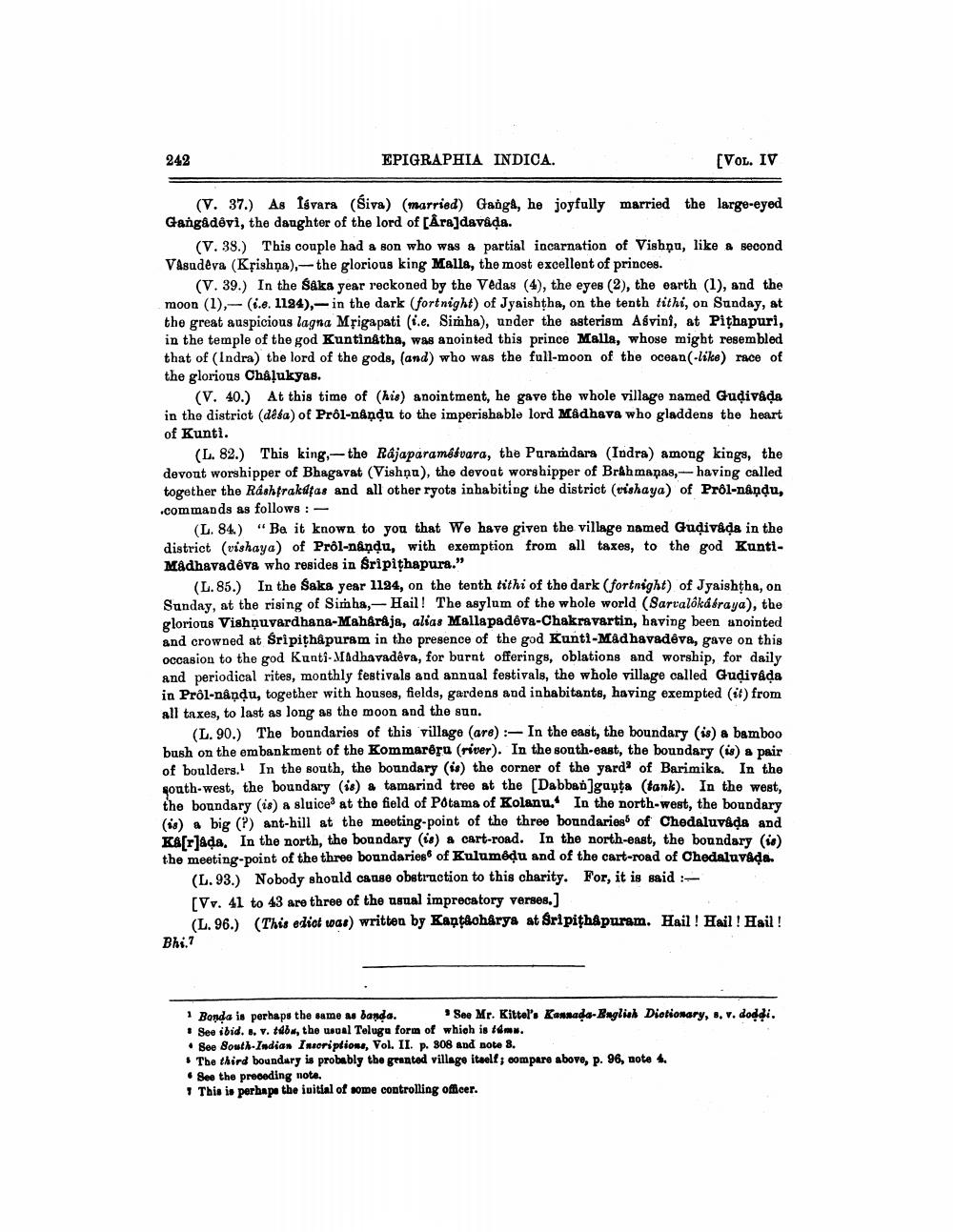________________
242
EPIGRAPHIA INDICA.
[VOL. IV
(V. 37.) As fśvara (Śiva) (married) Gang, he joyfully married the large-eyed Gangadhvi, the daughter of the lord of [Ara]davada.
(V.38.) This couple had a son who was a partial incarnation of Vishnu, like a second Vasudeva (Kfishņa),--the glorious king Malla, the most excellent of princes.
(V. 39.) In the saka year reckoned by the Vedas (4), the eyes (2), the earth (1), and the moon (1),- (i.e. 1124),- in the dark (fortnight) of Jyaishțha, on the tenth tithi, on Sunday, at the great auspicious lagna Msigapati (ie. Sinha), under the asterism Asvini, at Pithapuri, in the temple of the god Kuntingtha, was anointed this prince Malla, whose might resembled that of (Indra) the lord of the gods, (and) who was the full-moon of the ocean(-like) race of the glorious Chåļukyas.
(V. 40.) At this time of his) anointment, he gave the whole village named Gudivada in the district (data) of Prôl-nandu to the imperishable lord Madhava who gladdens the heart of Kunti.
(L. 82.) This king, the Rajaparamétvara, the Puraṁdara (Indra) among kings, the devout worshipper of Bhagavat (Vishņu), the devoat worshipper of Brahmapas,--having called together the Rashtrakdfas and all other ryots inhabiting the district (vishaya) of Pról-nandu, .commands as follows:
(L. 84.) "Ba it known to you that we have given the village named Gudivada in the district (vishaya) of Prôl-nându, with exemption from all taxes, to the god KuntiMadhavadeva who resides in Sripithapura."
(L. 85.) In the Saka year 1124, on the tenth tithi of the dark (fortnight) of Jyaishtha, on Sunday, at the rising of Simha,- Hail! The asylum of the whole world (Sarvalókábraya), the glorious Vishậuvardhana-Mahårája, alias Mallapadêva-Chakravartin, having been anointed and crowned at Sripithapuram in the presence of the god Kunti-Madhavadêva, gave on this occasion to the god Kunti. Madhavadêva, for burnt offerings, oblations and worship, for daily and periodical rites, monthly festivals and annual festivals, the whole village called Gudivada in Prôl-nându, together with houses, fields, gardens and inhabitants, having exempted (it) from all taxes, to last as long as the moon and the sun.
(L. 90.) The boundaries of this village (are) : - In the east, the boundary (is) a bamboo bush on the embankment of the Kommarēru (river). In the south-east, the boundary (is) a pair of boulders. In the south, the boundary (is) the corner of the yard of Barimika. In the south-west, the boundary (is) a tamarind tree at the [Dabban]gayta tank). In the west, the boundary (is) a sluiced at the field of Potama of Kolanu.“ In the north-west, the boundary (is) a big () ant-hill at the meeting point of the three boundaries of Chedaluvads and Karada. In the north, the boundary is) a cart-road. In the north-east, the boundary (10) the meeting point of the three boundaries of Kulumódu and of the cart-road of Chedaluvada.
(L. 93.) Nobody should cause obstruction to this charity. For, it is said : [Vv. 41 to 43 are three of the usual imprecatory verses.]
(L. 96.) (This odiot was) written by Kaptacharya at Sripithapuram. Hail! Hail! Hail! Bhi.7
Bonda is perhaps the same as banda. See Mr. Kittel'. Kannada-English Dictionary, s.v. doddi. . See ibid. s. v. tb, the usual Teluga form of which is tms. • See South Indian Inscriptions, Vol. II. p. 808 and note 8.
The third boundary is probably the granted village itself; compare above, p. 96, note 4. • See the preceding note.
This is perhaps the initial of some controlling ofhoer.




